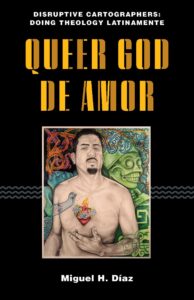Growing up as a culturally Irish American Catholic in the mid-twentieth century and hungering as I was for any illumination of the profound awareness I had as to my own gayness, a book like Miguel H. Díaz’ Queer God de Amor, if it had not frightened me, might well have been a key to a liberation still in progress some seventy years later.
A young friend called me last summer, and, in a breathtaking manner, shared news of this slim volume. Encouraged to get a copy, which, with this provocative title, I promptly did. When Queer God de Amor arrived, I retreated to my study and read Díaz’ book in one fell swoop.
As a former Jesuit, a psychotherapist and spiritual director, I received a superb theological, philosophical, and psychological education and, while I am involved in academia, I am not an academic. I have read several translations of Juan de la Cruz’s ineffable Dark Night of the Soul. The most recent has affected me deeply. It is the superb effort by Mirabai Starr who is a keen lover of Juan’s and Teresa’s testaments. As a Jesuit novice, I read Dark Night, kind of a primer on spirituality. Several years ago, I entered a spiritual desert, a dark wood. My spiritual director, after a late-into-the-night conversation, handed me this robust translation of Dark Night of the Soul. I tartly said: “I read that in the novitiate.” He responded: “Well, you’re not in the novitiate anymore.”
Juan’s sensuous and intricate metaphor, no, more than metaphor, unveiling of his relationship with the Divine, required of me enormous effort, and a heretofore untapped humility. With Juan de la Cruz as my companion, in time I came out of the desert, and my dark hiatus became a clear and necessary waystation on my spiritual journey.
As a gay man, one who has hewed to a spiritual path initially formed in me by the Society of Jesus, and—for the past forty years, as a married man—the journey to undo the deadening religious and socially imposed cultural self-loathing—as experienced similarly by most queer persons—is the work of a lifetime, done primarily alone.
Into this mix comes Queer God de Amor. Transgressive, disruptive, transforming, deeply reverent, a keen analysis not only of Juan de la Cruz’s erotically illuminated spiritual landscape, but penetratingly insightful into the relationship the Divine chooses to co-create with their beloveds. With you and me.
I will leave it to academic theologians to review this critically, and they will. My academic learnings did not prepare me for this book. My yearning could not have anticipated its arrival. Sex, gender, and aberrant spirituality have so riven the world for millennia, with such horrific results. And yet, this mystical, erotic undercurrent, a deep sense and awareness of the embodied presence of the Divine—for Díaz, represented sanjuanistamente—has been percolating up through the sludge of time. Díaz has constructed a spiritual and theological argument that, while vitally assaultive of some traditional and ossified theologies, will advance the human effort that Teilhard de Chardin also keenly saw, to make manifest the Love at the heart of creation, the Love that is the very stuff of the universe, in which all of creation necessarily takes part. And vitally, Love at the center—Merton’s le pointe vierge—of each of us, of all of us.
No one has quite done what Díaz has accomplished for queer persons—for all persons— before. McNeil, Boswell, Allison, Kelly, others have all broken theological ground. Díaz breaks open hearts and bodies, as well. “Grace transforms the whole person”, Díaz writes, “in the Dark Night, wherein, in the transformation of lover and beloved, amado y amada are fused and transformed one into the other” (65).
This book will change lives, queer and not, Latin and other, male and female and non-binary persons, too. It is a liberating work. Although an academic tome, it is popular theology at its most profound and effective expression. I am grateful for its life-giving effect on me and on those with whom I have shared this gift.
We owe Miguel Díaz un magnífico agradecimiento for this work.
[Spanish Translation]
El crecer como un católico cultural irlandés-americano a mediados del siglo XX, hambriento como estaba de cierta iluminación de la conciencia profunda que yo mismo tenía de mi propia homosexualidad, un libro como Queer God de Amor, de Miguel Díaz si no me hubiera asustado, bien pudo haber sido la llave de una liberación todavía en proceso setenta años después.
El verano pasado me llamó un joven amigo, y, de manera asombrosa, compartió las nuevas de este breve tomo. Alentado a conseguir una copia, que, con tan provocativo título accedí inmediatamente. Cuando arribó Queer God de Amor, me retiré a mi estudio y leí el libro de Díaz de una sola sentada.
Como exjesuita que soy, psicoterapeuta y director espiritual, recibí una excelente educación teológica, filosófica y psicológica, pero aunque estoy involucrado en las universidades, no soy académico. He leído varias traducciones de la inefable Noche oscura del alma de san Juan de la Cruz. La más reciente me ha afectado profundamente. Es el formidable esfuerzo de Mirabai Starr, gran amante de los testamentos de san Juan y santa Teresa. De novicio jesuita, leí La noche oscura, casi como preparación a la espiritualidad. Años después, entré en un desierto espiritual, un bosque oscuro. Mi director espiritual, luego de una conversación bien entrada en la noche, me entregó una traducción robusta de La noche oscura del alma. Le respondí secamente: “Eso lo leí en el noviciado.” A lo que respondió: “Pues, ya no estás en el noviciado.”
La sensual y compleja metáfora de Juan, no, más que metáfora, su desenmascarar de su relación con lo divino, requiere un enorme esfuerzo, y de aquí en adelante, una humildad inexplorada. Con San Juan de la Cruz como compañero, con el tiempo logré salir del desierto, y mi oscuro intervalo se convirtió en una clara y necesaria escala en mi camino espiritual.
Como hombre gay que ha cavado su camino espiritual inicialmente forjado en mí por la Compañía de Jesús, y por los últimos cuarenta años de hombre casado, la senda para deshacer el atenuado autodesprecio cultural impuesto religiosa y socialmente, así como lo experimentan similarmente la mayoría de las personas cuir, es una labor de toda una vida que se logra principalmente solo.
En esta mezcla viene Queer God de Amor. Transgresivo, interruptor, transformador, profundamente reverente, un análisis incisivo no solamente del paisaje iluminado eróticamente de san Juan de la Cruz, pero también pertinentemente incisivo en cuanto a la relación que lo divino elige para cocrear con sus amados. Contigo y conmigo.
Dejaré que los teólogos letrados revisen críticamente esto, y lo harán. Mis estudios académicos no me prepararon para este libro. Mis anhelos no hubieran podido anticipar su llegada. El sexo, el género, y una espiritualidad aberrante han acribillado tanto al mundo por milenios con resultados tan horrendos, empero, este trasfondo erótico, un profundo sentido y conciencia de la presencia encarnada de lo divino, para Díaz, representada sanjuanistamente, se ha estado filtrando a través del fango del tiempo. Díaz ha montado un argumento espiritual y teológico que, si bien es vitalmente agresivo de ciertas tradiciones y teologías osificadas, avanzará el esfuerzo humano que Teilhard de Chardin sabiamente vio, para manifestar el Amor al centro de la creación, el Amor que es la esencia misma del universo en el cual toda la creación necesariamente participa. Y vitalmente, el Amor al centro, le pointe vierge de Merton, de cada uno de nosotros, de todos nosotros.
Nadie ha hecho antes lo que Díaz ha logrado para las personas cuir, para todas las personas. McNeil, Boswell, Allison, Kelly y otros han abierto terreno teológico. Díaz abre corazones y cuerpos adicionalmente. “La gracia transforma a la persona entera”, escribe Díaz, “en la Noche Oscura, donde, en la transformación de amado y amada se funden y transforman el uno en el otro” (65).
Este libro cambiará vidas, cuir o no, latinas y otras, masculinas y femeninas y también de personas no binarias. Es una obra liberadora. Aunque es un tomo académico, es teología popular en su máxima y efectiva expresión. Estoy agradecido por su efecto vivificador en mí y en aquellos con quienes he compartido este obsequio.
Le debemos a Miguel Díaz un magnífico agradecimiento por esta obra.
Graduate Theological Union, Berkeley, CA




